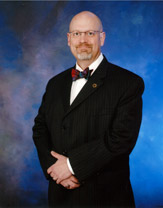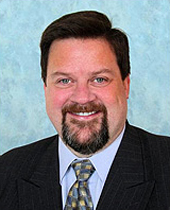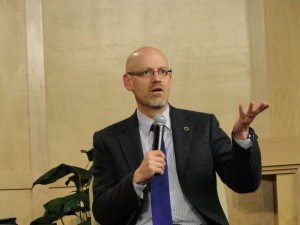 I am proud to call John Hendryx my friend. He is the founder and overseer of monergism.com, the most comprehensive theological website on the internet, as well as its blog site of reformationtheology.com (where I serve as one of the writing contributers).
I am proud to call John Hendryx my friend. He is the founder and overseer of monergism.com, the most comprehensive theological website on the internet, as well as its blog site of reformationtheology.com (where I serve as one of the writing contributers).
In the following short article John Hendryx responds to Roger Olson. He writes:
One of the major premises of Roger Olson’s new book “Against Calvinism” is his declaration that classic Reformed doctrine of meticulous providence makes God into a moral monster, or worse, indistinguishable from the devil. He asserts that the Calvinist cannot consistently affirm that God ordains all that comes to pass, including the wicked acts of men, without also making God the author of sin.
Does it follow? Not in the least. The charge that it makes God a moral monster if the God of Scripture ordains all things, even the wicked acts of men, rests ultimately on the assumption that unless we can explain his actions then we may sit in judgment upon Him. In other words, the charge rests purely upon rationalism and extra-biblical logic. We acknowledge that we cannot explain all of God’s secret acts since God has chosen not to reveal many things about Himself. But one very prominent feature of the Bible is that it frequently declares that God meticulously ordains all that comes to pass (Eph 1:11) AND that men are responsible for their actions. One major example sticks out: the greatest sin ever committed by men in history — the crucifixion of Jesus —when the Apostle Peter, preaching at Pentecost declares:
“…this Jesus, delivered up according to the definite plan and foreknowledge of God, you crucified and killed by the hands of lawless men.” (Acts 2:23)
and two chapters later in Acts it again says:
“…both Herod, and Pontius Pilate, with the Gentiles, and the people of Israel, were gathered together, For to do whatsoever thy hand and thy counsel determined before to be done.” (Acts 4:27-28)
The Bible itself testifies, in plain language, that God ordained evil men to crucify Jesus. Yet “lawless men” are 100% responsible for carrying it out. So those who embrace the Bible as authoritative need to be able to develop a theology which fits that into their view. While you may not understand it, you must yield to what the Scripture teaches regarding God’s meticulous hand of providence in all things, and His blamelessness in doing them.
The fatal flaw in Olson’s argument flows mostly from his insistence that Calvinists must somehow explain this philosophically or else we are being inconsistent, or worse, make God into a monster. But I would argue to the contrary: since the Bible holds forth our highest presuppositions, the most consistent position possible is to yield to the Bible’s teaching that both are true. God does not tell us much about HOW he can ordain evil acts while not being guilty of evil, only shows many examples where He does so. It may be a mystery for human beings to understand, yet crystal clear as regards to its established truth.
Likewise, nowhere in the Bible did God call us to work out the details of this doctrine by philosophical means, or pry into the secret things of God. Rather He calls us to be faithful to the Text that says God ordains all things, even evil, and that, at the same time, God is blameless in doing so. That He ordains sin sinlessly. I do not have to hold these truths together rationally (according to human knowledge) or philosophically but because they are axiomatic in the Bible. My understanding the intricacies of how this comes about is secondary. God is God. DO our finite minds have to understand HOW He does this in order for it to be true?
It appears that, ultimately, Olson’s objections to this are moral and philosophical rather than exegetical. He is, therefore, basing his considerations and thus his theological foundations on sand. The conclusions we reach, I would contend, must be based on what the Scripture says. For the alternative is to draw our highest presuppositions from something other than an authoritative source, such as unaided human reason. It is of utmost importance that he come up with exegetical grounds for his position, rather than base his theology on an emotional reaction.
I honestly cringe for Olson when he says that if God ordains evil events then God is indistinguishable from the devil, because the Bible declares that God does ordain them, and also declares that he does so blamelessly, i.e. without sin. And if our theology is biblical, (and I believe it is) then Dr. Olson ends up calling God a monster or worse, the devil. YIKES!!! I would not want to be him.
Note: It should be a given for Christians, that due to the fall, all human beings are not safe from temporal and eternal punishment. Why should it, therefore, so surprise Olson that God justly exercises this authority during our lives? Judgement has already begun east of Eden and we all are subject to death. So nothing (no suffering) should surprise us here except for the great mercy He has shown us in Jesus Christ. Regarding the Tower of Siloam (Luke 13:4), Jesus declared that it did not fall on people for their particular sin(s) because they were somehow worse that others, but as a sign in this fallen world that we are all ill-deserving sinners, under a curse who need to repent and receive the mercy of Jesus Christ. Don’t be surprised that the tower fell on those people – let it be a sober reminder that you deserve the same.
Similar Online Resources
Seven things the Bible says about Evil by Johnathon Bowers
Letter from Visitor on Calvinism, Evil and God’s Holiness by John Hendryx
Testing Roger Olson’s Depth of Exegesis: 1 Timothy 2:4 by James White
Now available at Monergism Books “For Calvinism” by Michael Horton and “Against Calvinism” by Roger Olson.

 I am proud to call John Hendryx my friend. He is the founder and overseer of monergism.com, the most comprehensive theological website on the internet, as well as its blog site of reformationtheology.com (where I serve as one of the writing contributers).
I am proud to call John Hendryx my friend. He is the founder and overseer of monergism.com, the most comprehensive theological website on the internet, as well as its blog site of reformationtheology.com (where I serve as one of the writing contributers). Below is a transcript from a C. H. Spurgeon sermon where he describes the covenant of redemption and then wonders what it would have been like to be to hear this covenant being made.
Below is a transcript from a C. H. Spurgeon sermon where he describes the covenant of redemption and then wonders what it would have been like to be to hear this covenant being made. “Traditions, everyone has them and those most blinded to them are those who do not believe they have any.” – Dr. James White
“Traditions, everyone has them and those most blinded to them are those who do not believe they have any.” – Dr. James White God Is Sovereign Over . . .
God Is Sovereign Over . . . “It seems odd, Commenting and Commentaries (London: Passmore & Alabaster, 1876), 1.
“It seems odd, Commenting and Commentaries (London: Passmore & Alabaster, 1876), 1. Phil’s reply: You have seriously misunderstood Sola Scriptura if you really imagine that it rules out human teachers or eliminates systematic theology. The Reformers (including Calvin) often cited the works of Augustine, Tertullian, Jerome, Cyprian, Ambrose, and others-ranging from the early church fathers through Aquinas. They didn’t follow any of them slavishly, of course, but they certainly took them seriously. Not one of the major Reformers would have tolerated the claim that because the Church Fathers were mere men they were therefore irrelevant or incapable of shedding any helpful light on tough theological questions.
Phil’s reply: You have seriously misunderstood Sola Scriptura if you really imagine that it rules out human teachers or eliminates systematic theology. The Reformers (including Calvin) often cited the works of Augustine, Tertullian, Jerome, Cyprian, Ambrose, and others-ranging from the early church fathers through Aquinas. They didn’t follow any of them slavishly, of course, but they certainly took them seriously. Not one of the major Reformers would have tolerated the claim that because the Church Fathers were mere men they were therefore irrelevant or incapable of shedding any helpful light on tough theological questions.  Transcript from an audio teaching by Dr. James White – Part 1
Transcript from an audio teaching by Dr. James White – Part 1 Perhaps you can relate to this – Divine election does indeed seem to be clearly taught in the Bible. Passages such as Romans 8 and 9, Ephesians 1 and 2, John 3, John 6, John 10, John 17, and many others, make a convincing case. However, certain verses, at least at first glance, seem to present a different picture.
Perhaps you can relate to this – Divine election does indeed seem to be clearly taught in the Bible. Passages such as Romans 8 and 9, Ephesians 1 and 2, John 3, John 6, John 10, John 17, and many others, make a convincing case. However, certain verses, at least at first glance, seem to present a different picture. “WHAT ABOUT” CONCEPTS:
“WHAT ABOUT” CONCEPTS: